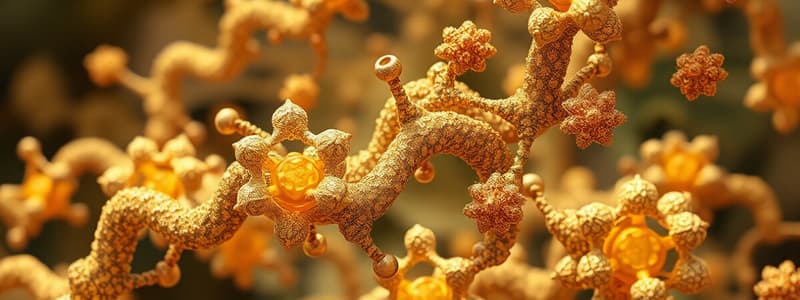Podcast
Questions and Answers
What is the primary role of enzymes in biological reactions?
What is the primary role of enzymes in biological reactions?
- Lower activation energy to speed up reactions (correct)
- Increase activation energy needed for reactions
- Act as substrates in chemical reactions
- Alter the chemical composition of products
Which suffix is commonly used to denote enzymes?
Which suffix is commonly used to denote enzymes?
- -ase (correct)
- -zyme
- -ine
- -ose
Which factor is NOT known to affect enzyme activity?
Which factor is NOT known to affect enzyme activity?
- Substrate concentration
- Color of the solution (correct)
- Temperature
- Enzyme concentration
What is the active site of an enzyme?
What is the active site of an enzyme?
What is the primary structural composition of most enzymes?
What is the primary structural composition of most enzymes?
Flashcards are hidden until you start studying
Study Notes
Enzyme Definition
- Biological catalysts
- Not consumed during a chemical reaction
- Essential for many biological processes
- Mostly proteins
- Highly specific, function optimally at body temperature (37°C) and physiological pH (7)
- Suffix "-ase"
Activation Energy
- The minimum energy required for a chemical reaction to start
- Catalysts reduce activation energy
Enzyme Classification
- Oxidoreductases
- Catalyze oxidation-reduction reactions
- Transferases
- Transfer functional groups
- Hydrolases
- Break down molecules by adding water
- Lyases
- Break down molecules, but don't require water
- Isomerases
- Convert molecules into isomers
- Ligases
- Join molecules together
Mechanism of Enzyme Action
- Binding of substrate to the enzyme's active site
- Active site is the specific area that binds to the substrate
Factors Affecting Enzyme Activity
Temperature
- Increases reaction rate, up to a point
- Beyond the optimal temperature, the enzyme denatures, and its activity decreases
pH
- Each enzyme has an optimal pH
- Deviation from the optimal pH can denature the enzyme
Enzyme Concentration
- Increased enzyme concentration leads to a higher reaction rate
- Up to a point where the substrate becomes limiting
Substrate Concentration
- Increased substrate concentration leads to a higher reaction rate
- Up to a point where the enzyme becomes saturated and the reaction rate plateaus
Studying That Suits You
Use AI to generate personalized quizzes and flashcards to suit your learning preferences.



